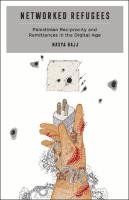Networked Refugees
Palestinian Reciprocity and Remittances in the Digital Age
| dc.contributor.author | Hajj, Nadya | |
| dc.date.accessioned | 2021-11-11T11:33:26Z | |
| dc.date.available | 2021-11-11T11:33:26Z | |
| dc.date.issued | 2021 | |
| dc.identifier | ONIX_20211111_9780520383258_4 | |
| dc.identifier | OCN: 1248598008 | |
| dc.identifier.uri | https://library.oapen.org/handle/20.500.12657/51418 | |
| dc.description.abstract | Almost 68.5 million refugees in the world today live in a protection gap, the chasm between protections stipulated in the Geneva Convention and the abrogation of those responsibilities by aid agencies. With dwindling humanitarian aid, how do refugee communities solve collective dilemmas? In Networked Refugees, Nadya Hajj finds that Palestinian refugees utilize information communication technology platforms to motivate reciprocity—a cooperative action marked by the mutual exchange of favors and services—and informally seek aid and connection with their transnational diaspora community. Based on surveys conducted with Palestinians throughout the diaspora, interviews with those inside the Nahr al-Bared refugee camp in Lebanon, and data pulled from online community spaces, these findings pushback against the cynical idea that online organizing is fruitless, emphasizing instead the productivity of these digital networks. “With nuance, sensitivity, and fascinating connections across diverse social settings, Nadya Hajj offers a blueprint for how transnational networks can motivate reciprocity to solve communal problems.” WENDY PEARLMAN, author of Violence, Nonviolence, and the Palestinian National Movement “In this remarkable book, Hajj deploys her considerable theoretical and empirical gifts. This book is essential reading for anyone interested in understanding refugee experience.” TAREK MASOUD, coauthor of The Arab Spring: Pathways of Repression and Reform “Through stunning ethnographic and survey research, Hajj provides enormous insights into the way Palestinian refugees in Lebanon and the diaspora not only resist the destruction of their community but have found new ways of rebuilding it, challenging us to think differently about Palestinian refugees and their reimagined futures.” SARA ROY, Harvard University | |
| dc.language | English | |
| dc.subject.classification | thema EDItEUR::J Society and Social Sciences::JB Society and culture: general::JBF Social and ethical issues::JBFG Refugees and political asylum | en_US |
| dc.subject.classification | thema EDItEUR::N History and Archaeology::NH History::NHG Middle Eastern history | en_US |
| dc.subject.classification | thema EDItEUR::T Technology, Engineering, Agriculture, Industrial processes::TB Technology: general issues | en_US |
| dc.subject.other | Critical Refugee Studies | |
| dc.subject.other | Middle Eastern Studies | |
| dc.subject.other | Tech Studies | |
| dc.title | Networked Refugees | |
| dc.title.alternative | Palestinian Reciprocity and Remittances in the Digital Age | |
| dc.type | book | |
| oapen.identifier.doi | 10.1525/luminos.111 | |
| oapen.relation.isPublishedBy | 72f3a53e-04bb-4d73-b921-22a29d903b3b | |
| oapen.relation.isbn | 9780520383258 | |
| oapen.relation.isbn | 9780520383241 | |
| oapen.imprint | University of California Press | |
| oapen.pages | 148 | |
| oapen.place.publication | Oakland |

